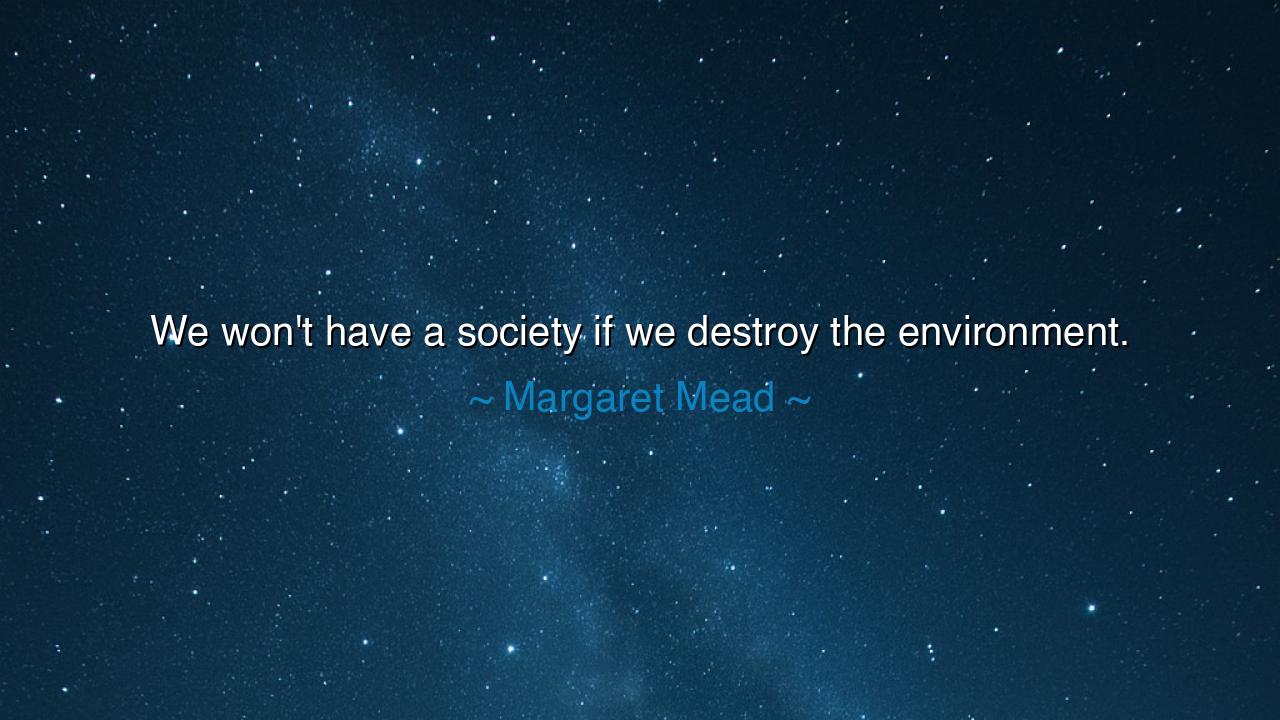
We won't have a society if we destroy the environment.






When Margaret Mead spoke the words, “We won’t have a society if we destroy the environment,” she spoke not as a mere scholar of culture, but as a prophet of civilization itself. Her voice, calm yet unyielding, carried the warning of one who understood the ancient bond between humankind and the earth—a bond older than cities, older than nations, older even than memory. In her wisdom, Mead saw that no empire, no economy, no art, no law can endure upon a dying planet. The soil must live for the people to live; the rivers must flow for the heart of civilization to beat. Her words are not a prediction of doom—they are a call to remembrance, a plea to recall what we have forgotten: that society and nature are one body, and when one is destroyed, the other perishes with it.
The origin of this truth lay in Mead’s life’s work. As an anthropologist, she wandered the farthest reaches of the earth—from the islands of Samoa to the jungles of New Guinea—studying the ways of humanity. She saw how every culture, however distant or small, drew its identity from the land that nourished it. The people of the islands lived by the tides; the tribes of the forests by the seasons; the herders by the rhythm of the plains. To harm the earth was to unravel the tapestry of their existence. And so Mead understood that the environment is not the background of civilization—it is its foundation. Without it, there can be no society, no peace, no future.
To destroy the environment, therefore, is to commit a quiet form of self-destruction. Yet humanity, blinded by greed and illusion, has often struck at its own roots. The forests fall, the seas are poisoned, the air thickens with the smoke of our ambition—and still we call this progress. We forget that the Earth, patient and generous, can be wounded beyond repair. We speak of “resources” as though they were endless, and of “growth” as though it were eternal. But Mead, in her clear vision, saw the end of that path: a world of scarcity, chaos, and loss. “We won’t have a society,” she warned—not because war would destroy us, but because our neglect of the earth would quietly erase the conditions that make life itself possible.
History, too, bears witness to her words. Consider the story of Easter Island, once a thriving world of art and ceremony. Its people, in their hunger for greatness, cut down every tree to build monuments to their gods and chiefs. They felled the last forest without knowing it was the last. When the trees were gone, the soil eroded, the birds vanished, and famine came. The great society that had raised its statues to the heavens collapsed into silence. What destroyed them was not invasion, nor disease, but the simple failure to live in balance with their land. Thus the lesson of Easter Island became the mirror of all humanity: no civilization can outlive the earth that sustains it.
Yet Mead’s message is not one of despair—it is one of awakening. She believed that the same species that can destroy the world can also save it. Awareness is the beginning of salvation. If we understand that our lives, our families, our dreams depend upon the living earth, then we will learn to protect it as we would our own flesh. Every tree planted, every river restored, every act of restraint is an offering to the future. Society does not begin in the marketplace or the palace; it begins in the soil, the air, and the water. To care for these is to care for civilization itself.
In her wisdom, Mead also understood that change begins not with governments, but with individuals. She once said, “Never doubt that a small group of thoughtful, committed citizens can change the world; indeed, it’s the only thing that ever has.” Thus, the real cure for environmental destruction lies not in fear, but in collective courage. Each act of preservation, no matter how small, is a seed of renewal. The farmer who plants with care, the child who learns to love the forest, the leader who values balance over profit—all are part of the same sacred work.
So let these words be carried like a flame into the hearts of those who listen: We won’t have a society if we destroy the environment. The mountains, the seas, the forests—they are the silent pillars that hold up our world. When they fall, everything we have built will crumble. But if we choose wisely, if we walk gently upon the earth and remember that it is not ours to own but ours to protect, then society will not only survive—it will thrive in harmony with the world that birthed it.
Let the lesson of Margaret Mead be our covenant: that civilization is not measured by its power over nature, but by its partnership with it. Let us live not as conquerors, but as caretakers—faithful stewards of the only home we have. For when we honor the earth, we honor ourselves; and when we save her, we save the soul of humanity.






AAdministratorAdministrator
Welcome, honored guests. Please leave a comment, we will respond soon